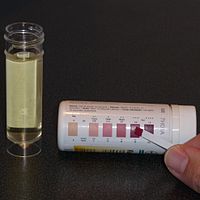
Photo from wikipedia
Abstract Increasing potassium and reducing sodium intake have been identified as a priority intervention to reduce non-communicable diseases. A low sodium high potassium (LSHP) healthy diet can be a predictor… Click to show full abstract
Abstract Increasing potassium and reducing sodium intake have been identified as a priority intervention to reduce non-communicable diseases. A low sodium high potassium (LSHP) healthy diet can be a predictor of overall dietary quality and is associated with higher diet costs. The present study was a randomised controlled-feeding trial, formulating menus of low sodium and potassium-rich healthy diet and comparing with usual diet (a control diet based on typical Indonesian diet) to assess the association of potassium intake in the menus with other nutritional contents and diet cost. Totally seventy menus, which consisted of LSHP diets and the usual diets for a 7-d cycle, were composed from the analysis of the Indonesian food composition database. The correlation coefficient of the potassium content of all menus with nutritional quality and diet cost was analysed using the Pearson test. Multiple linear regression analysis was performed to determine the most important nutrient in determining diet cost. A comparison of nutrition quality and diet cost from the two menus was analysed using the independent t-test. LSHP diet had significantly higher carbohydrate, protein, fibre, magnesium, calcium, vitamin C, potassium density and diet cost but lower total fat, saturated fat and energy density than the usual diet (P < 0⋅05). Furthermore, there was a strong positive correlation between fibre, potassium and diet cost (coefficient correlation of >0⋅8). Potassium is a nutrient that is closely related to diet quality although the cost of the diet often may inhibit its intake. A targeted and effective strategy is required to provide affordable food for achieving a sustainable nutrient-rich diet.
Journal Title: Journal of Nutritional Science
Year Published: 2022
Link to full text (if available)
Share on Social Media: Sign Up to like & get
recommendations!